
Contract
Contract
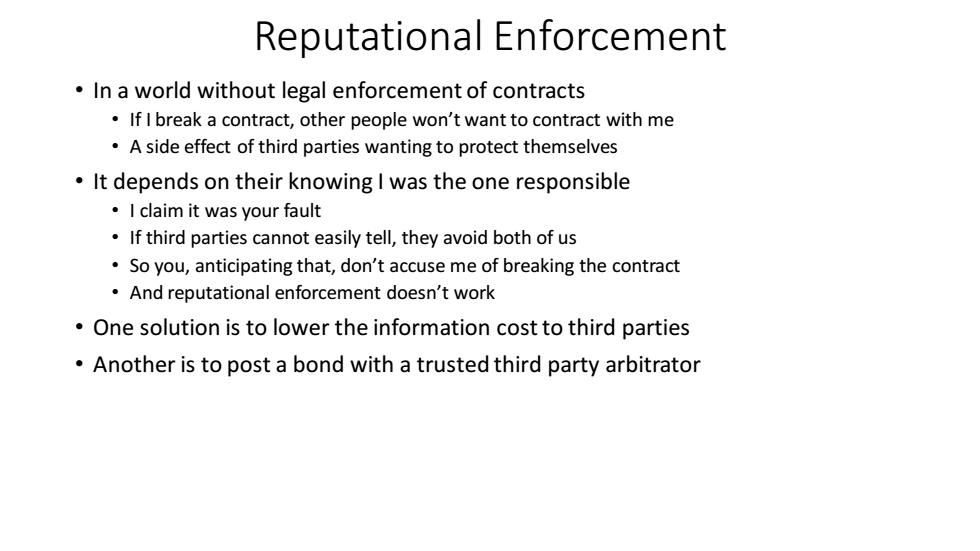
Reputational Enforcement In a world without legal enforcement of contracts If I break a contract,other people won't want to contract with me A side effect of third parties wanting to protect themselves It depends on their knowing I was the one responsible I claim it was your fault If third parties cannot easily tell,they avoid both of us So you,anticipating that,don't accuse me of breaking the contract And reputational enforcement doesn't work One solution is to lower the information cost to third parties Another is to post a bond with a trusted third party arbitrator
Reputational Enforcement • In a world without legal enforcement of contracts • If I break a contract, other people won’t want to contract with me • A side effect of third parties wanting to protect themselves • It depends on their knowing I was the one responsible • I claim it was your fault • If third parties cannot easily tell, they avoid both of us • So you, anticipating that, don’t accuse me of breaking the contract • And reputational enforcement doesn’t work • One solution is to lower the information cost to third parties • Another is to post a bond with a trusted third party arbitrator
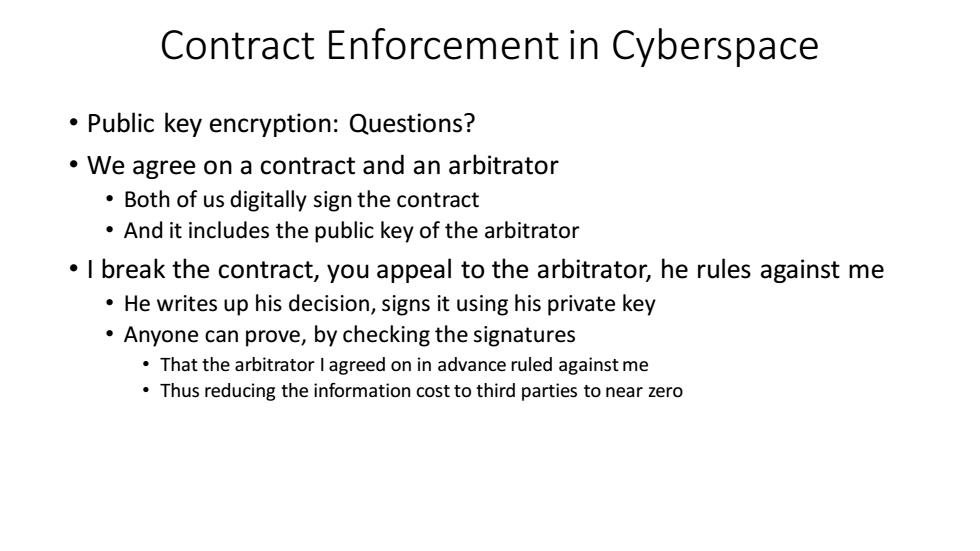
Contract Enforcement in Cyberspace Public key encryption:Questions? We agree on a contract and an arbitrator Both of us digitally sign the contract And it includes the public key of the arbitrator I break the contract,you appeal to the arbitrator,he rules against me He writes up his decision,signs it using his private key Anyone can prove,by checking the signatures That the arbitrator I agreed on in advance ruled against me Thus reducing the information cost to third parties to near zero
Contract Enforcement in Cyberspace • Public key encryption: Questions? • We agree on a contract and an arbitrator • Both of us digitally sign the contract • And it includes the public key of the arbitrator • I break the contract, you appeal to the arbitrator, he rules against me • He writes up his decision, signs it using his private key • Anyone can prove, by checking the signatures • That the arbitrator I agreed on in advance ruled against me • Thus reducing the information cost to third parties to near zero
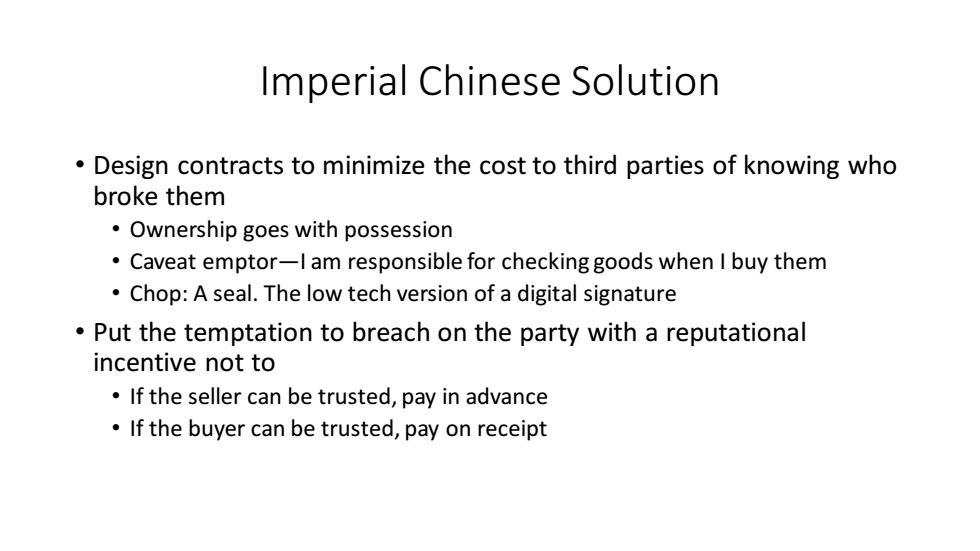
Imperial Chinese Solution Design contracts to minimize the cost to third parties of knowing who broke them Ownership goes with possession Caveat emptor-I am responsible for checking goods when I buy them Chop:A seal.The low tech version of a digital signature Put the temptation to breach on the party with a reputational incentive not to If the seller can be trusted,pay in advance If the buyer can be trusted,pay on receipt
Imperial Chinese Solution • Design contracts to minimize the cost to third parties of knowing who broke them • Ownership goes with possession • Caveat emptor—I am responsible for checking goods when I buy them • Chop: A seal. The low tech version of a digital signature • Put the temptation to breach on the party with a reputational incentive not to • If the seller can be trusted, pay in advance • If the buyer can be trusted, pay on receipt

So why do we have contract law? To decide if there is a contract Courts may not wish to enforce all contracts either because They do not trust individuals to act in their own interest(paternalism)or They believe some contracts have large effects on third parties [Perhaps,inability to contract acts as a commitment strategy] Because there is never enough small print to cover everything If the court's default rules are known,parties can leave things out Unless they disagree with the default rule
So why do we have contract law? • To decide if there is a contract • Courts may not wish to enforce all contracts either because • They do not trust individuals to act in their own interest (paternalism) or • They believe some contracts have large effects on third parties • [Perhaps, inability to contract acts as a commitment strategy] • Because there is never enough small print to cover everything • If the court’s default rules are known, parties can leave things out • Unless they disagree with the default rule

The Case for Freedom of Contract Coase Theorem in a low transaction cost context What about a monopoly seller? It still pays me to include features that benefit you more than they cost me But contract terms can be used for price discrimination An alternative to charging those who value the product more a higher price Provide a contract tuned in favor of the marginal customer Even if doing so is inefficient The result does not hold if price is fixed:an apartment under rent control It pays the landlord to lower quality if doing so saves him money Even if it is inefficient So there is an argument for mandatory terms(and for abolishing rent control)
The Case for Freedom of Contract • Coase Theorem in a low transaction cost context • What about a monopoly seller? • It still pays me to include features that benefit you more than they cost me • But contract terms can be used for price discrimination • An alternative to charging those who value the product more a higher price • Provide a contract tuned in favor of the marginal customer • Even if doing so is inefficient • The result does not hold if price is fixed: an apartment under rent control • It pays the landlord to lower quality if doing so saves him money • Even if it is inefficient • So there is an argument for mandatory terms (and for abolishing rent control)
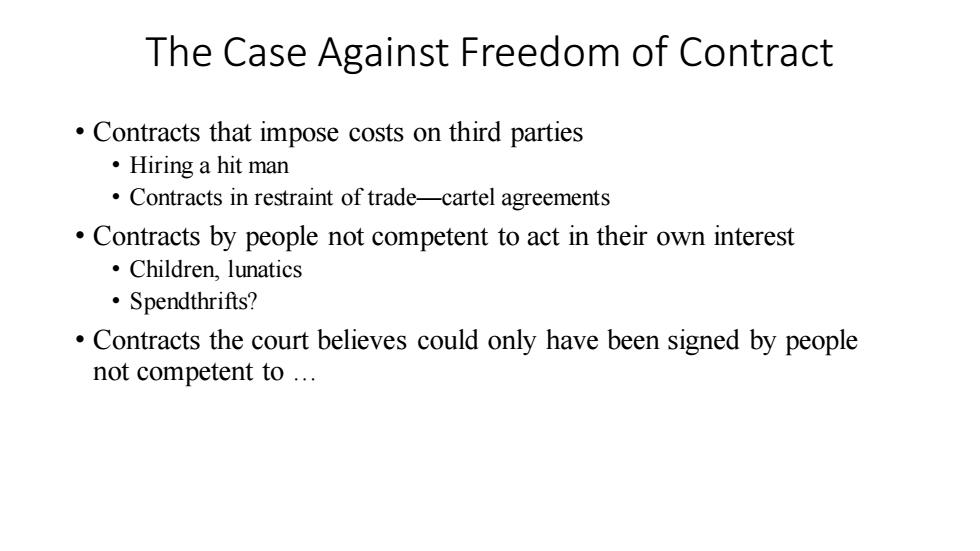
The Case Against Freedom of Contract Contracts that impose costs on third parties ·Hiring a hit man Contracts in restraint of trade-cartel agreements Contracts by people not competent to act in their own interest ·Children,.lunatics ·Spendthrifts? Contracts the court believes could only have been signed by people not competent to
The Case Against Freedom of Contract • Contracts that impose costs on third parties • Hiring a hit man • Contracts in restraint of trade—cartel agreements • Contracts by people not competent to act in their own interest • Children, lunatics • Spendthrifts? • Contracts the court believes could only have been signed by people not competent to …
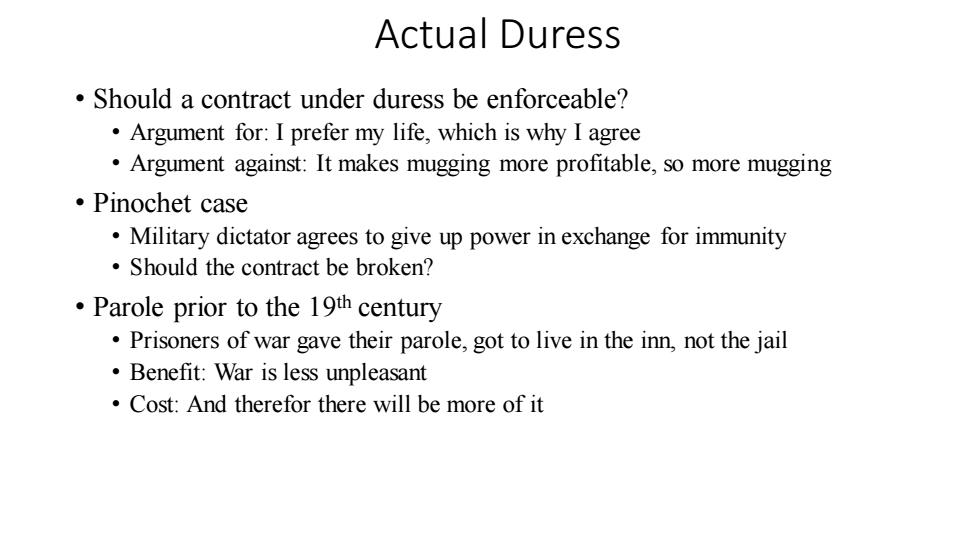
Actual Duress Should a contract under duress be enforceable? Argument for:I prefer my life,which is why I agree Argument against:It makes mugging more profitable,so more mugging ·Pinochet case Military dictator agrees to give up power in exchange for immunity Should the contract be broken? Parole prior to the 19th century Prisoners of war gave their parole,got to live in the inn,not the jail Benefit:War is less unpleasant Cost:And therefor there will be more of it
Actual Duress • Should a contract under duress be enforceable? • Argument for: I prefer my life, which is why I agree • Argument against: It makes mugging more profitable, so more mugging • Pinochet case • Military dictator agrees to give up power in exchange for immunity • Should the contract be broken? • Parole prior to the 19th century • Prisoners of war gave their parole, got to live in the inn, not the jail • Benefit: War is less unpleasant • Cost: And therefor there will be more of it
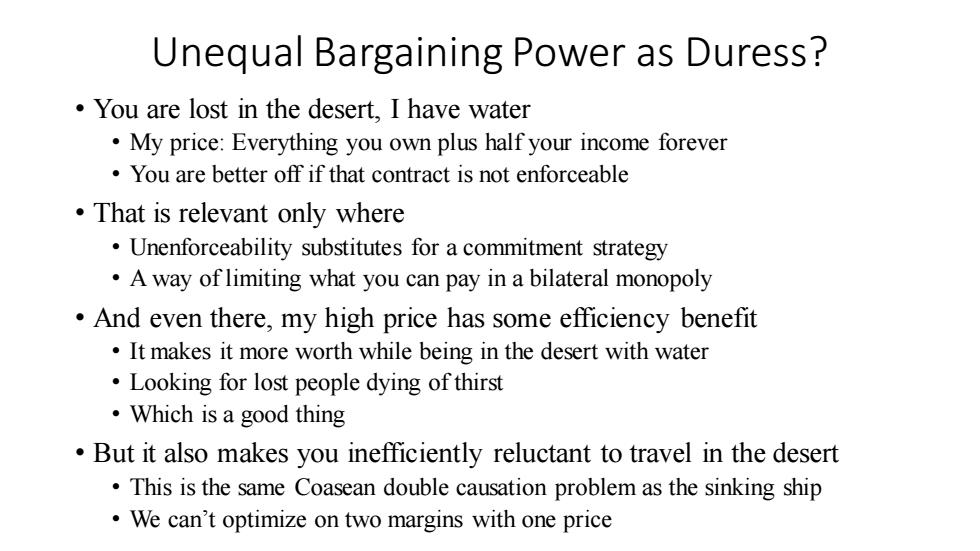
Unequal Bargaining Power as Duress? You are lost in the desert,I have water My price:Everything you own plus half your income forever You are better off if that contract is not enforceable That is relevant only where Unenforceability substitutes for a commitment strategy A way of limiting what you can pay in a bilateral monopoly And even there,my high price has some efficiency benefit It makes it more worth while being in the desert with water Looking for lost people dying of thirst ·Which is a good thing But it also makes you inefficiently reluctant to travel in the desert This is the same Coasean double causation problem as the sinking ship We can't optimize on two margins with one price
Unequal Bargaining Power as Duress? • You are lost in the desert, I have water • My price: Everything you own plus half your income forever • You are better off if that contract is not enforceable • That is relevant only where • Unenforceability substitutes for a commitment strategy • A way of limiting what you can pay in a bilateral monopoly • And even there, my high price has some efficiency benefit • It makes it more worth while being in the desert with water • Looking for lost people dying of thirst • Which is a good thing • But it also makes you inefficiently reluctant to travel in the desert • This is the same Coasean double causation problem as the sinking ship • We can’t optimize on two margins with one price
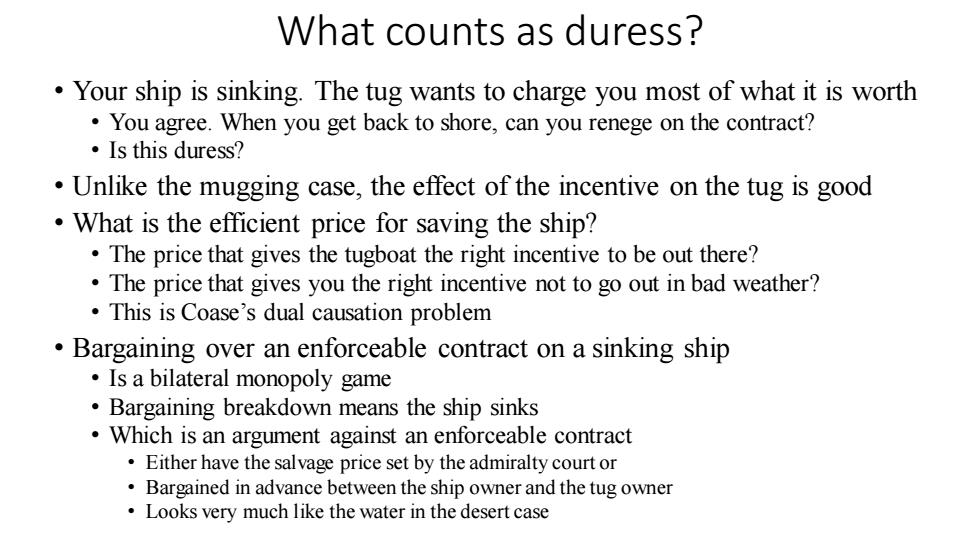
What counts as duress? Your ship is sinking.The tug wants to charge you most of what it is worth You agree.When you get back to shore,can you renege on the contract? ·Is this duress? Unlike the mugging case,the effect of the incentive on the tug is good What is the efficient price for saving the ship? The price that gives the tugboat the right incentive to be out there? The price that gives you the right incentive not to go out in bad weather? This is Coase's dual causation problem Bargaining over an enforceable contract on a sinking ship Is a bilateral monopoly game Bargaining breakdown means the ship sinks Which is an argument against an enforceable contract Either have the salvage price set by the admiralty court or Bargained in advance between the ship owner and the tug owner Looks very much like the water in the desert case
What counts as duress? • Your ship is sinking. The tug wants to charge you most of what it is worth • You agree. When you get back to shore, can you renege on the contract? • Is this duress? • Unlike the mugging case, the effect of the incentive on the tug is good • What is the efficient price for saving the ship? • The price that gives the tugboat the right incentive to be out there? • The price that gives you the right incentive not to go out in bad weather? • This is Coase’s dual causation problem • Bargaining over an enforceable contract on a sinking ship • Is a bilateral monopoly game • Bargaining breakdown means the ship sinks • Which is an argument against an enforceable contract • Either have the salvage price set by the admiralty court or • Bargained in advance between the ship owner and the tug owner • Looks very much like the water in the desert case